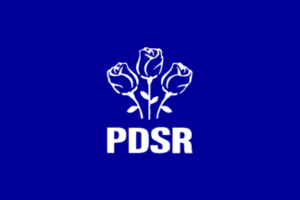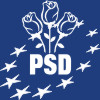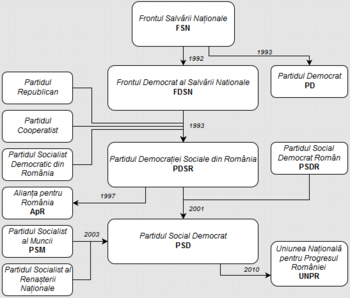Social Democratic Party (Romania) facts for kids
Quick facts for kids <div style="padding-top:0.3em; padding-bottom:0.3em; border-top:2px solid Lua error in Module:European_and_national_party_data/config at line 227: attempt to index field 'data' (a nil value).; border-bottom:2px solid Lua error in Module:European_and_national_party_data/config at line 227: attempt to index field 'data' (a nil value).; line-height: 1;">
Social Democratic Party
Partidul Social Democrat
|
|
|---|---|
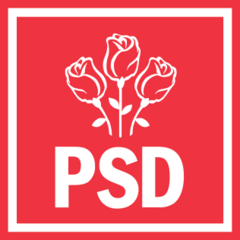 |
|
| Abbreviation | PSD |
| President | Sorin Grindeanu (acting) |
| Secretary-General | Paul Stănescu |
| First Vice President | Daniel Băluță |
| Honorary President | Ion Iliescu † |
| Leader in the Senate | Daniel-Cătălin Zamfir |
| Leader in the Chamber of Deputies | Ștefan-Ovidiu Popa |
| Leader in the European Parliament | Mihai Tudose |
| Founders | FDSN: List
Ion Iliescu
Vasile Văcaru Ion Solcanu Oliviu Gherman Diodor Nicoară Gheorghe Dumitrașcu Ion Tătar Emanuil Cernescu Ion Neagu Gheorghe Damian Vasile Secăreș Vladimir Pasti Petre Ninosu Alexandru Albu Petre Ţurlea Adrian Năstase Șerban Nicolae Adrian Năstase Alexandru Athanasiu |
| Founded | 10 July 1993 (as PDSR) 16 June 2001 (сurrent form) |
| Merger of |
|
| Headquarters | Șoseaua Kiseleff 10, Bucharest |
| Student wing | League of Social Democratic Students |
| Youth wing | Social Democratic Youth |
| Women's wing | OFSD |
| Membership (2015) | 530,000 |
| Ideology |
|
| Political position | Centre-left |
| National affiliation |
Alliances
Red Quadrilateral (1992–96)
Social Democratic Pole of Romania (2000–04) National Union PSD+PUR (2004–05) Alliance PSD+PC (2008–09) Social Liberal Union (2011–14) Centre Left Alliance (2012–14) Social Democratic Union (2014–19) National Coalition for Romania (2021–25) Romania Forward (2025) |
| European affiliation | Party of European Socialists |
| International affiliation | Progressive Alliance Socialist International |
| European Parliament group | Progressive Alliance of Socialists and Democrats |
| Colours | Red White |
| Senate | Lua error in Module:European_and_national_party_data/config at line 227: attempt to index field 'data' (a nil value). |
| Chamber of Deputies | Lua error in Module:European_and_national_party_data/config at line 227: attempt to index field 'data' (a nil value). |
| European Parliament | Lua error in Module:European_and_national_party_data/config at line 227: attempt to index field 'data' (a nil value). |
| Mayors |
1,362 / 3,176
|
| County Presidents |
25 / 41
|
| County Councilors |
362 / 1,340
|
| Local Council Councilors |
16,499 / 39,900
|
| Ministers |
6 / 16
|
| Party flag | |
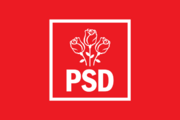 |
|
| Website | |
| Lua error in Module:European_and_national_party_data/config at line 227: attempt to index field 'data' (a nil value). | |
|
^ A: Also sometimes described as a big tent or catch-all party. |
|
The Social Democratic Party (in Romanian: Partidul Social Democrat), often called PSD, is a major political party in Romania. It is the largest social democratic party in the country. The party was started by Ion Iliescu, who became Romania's first democratically elected president in 1990.
The PSD is part of several international groups, including the Progressive Alliance (PA), the Socialist International (SI), and the Party of European Socialists (PES). In 2015, the party had about 530,000 members.
The PSD's history goes back to the Democratic National Salvation Front (FDSN). This group formed in 1992 from a larger party called the National Salvation Front (FSN). In 1993, the FDSN joined with three other parties to become the Party of Social Democracy in Romania (PDSR). The party got its current name, PSD, in 2001 after merging with a smaller group called the Romanian Social Democratic Party (PSDR).
Since it was formed, the PSD has been one of the two most important political parties in Romania. The PDSR led the government from 1992 to 1996. The PSDR was a smaller partner in the government from 1996 to 2000. After the merger, the PSD was the main party in charge from 2000 to 2004, and again from March 2014 to November 2015. It also played a big role in governments between 2008 and 2009, and from 2012 to 2014.
The PSD left the government in November 2015 when its leader, Victor Ponta, stepped down. However, the party won a big victory in the 2016 Romanian legislative election and returned to power in January 2017. They stayed in government until 2019. After a period in opposition, the PSD returned to government in late 2021 as part of a large coalition.
Ion Iliescu, who founded the party, is the only PSD member to have served as President of Romania. He was president from 1989 to 1996, and again from 2000 to 2004.
Today, the PSD is still the largest party in the Parliament of Romania. It holds many seats in both the Senate of Romania and the Chamber of Deputies. The party also has the most mayors and a large number of local and county councilors. This makes it a very strong political force in Romania.
Contents
How the Party Started
After a meeting of the National Salvation Front (FSN) in May 1992, Ion Iliescu and his supporters left the FSN. They then formed the Democratic National Salvation Front (FDSN). The rest of the FSN became the Democratic Party.
At its first big meeting in June 1992, the FDSN decided to support Ion Iliescu for the 1992 Romanian general election. They won, and Iliescu's party governed Romania until 1996. On July 10, 1993, the FDSN changed its name to the Party of Social Democracy in Romania (PDSR). This happened after it merged with the Socialist Democratic Party of Romania, the Republican Party, and the Cooperative Party.
From 1992 to 1996, the PDSR governed with other parties like the Romanian National Unity Party (PUNR) and the Greater Romania Party (PRM). This group was sometimes called the "Red Quadrilateral" by the media.
The PDSR became an opposition party after the 1996 Romanian general election. That election was won by a different group called the Romanian Democratic Convention (CDR).
After a period of economic challenges, the PDSR made a strong comeback. They won the 2000 Romanian general election as part of a group called the Social Democratic Pole of Romania. This group included the Romanian Social Democratic Party (PSDR) and the Romanian Humanist Party (PUR). The PSDR then merged with the PDSR on June 16, 2001. This is when the party officially became the PSD. Adrian Năstase, the leader of the PDSR/PSD, became prime minister.
In November 2004, Adrian Năstase ran for president. He won the first round but lost the second round to Traian Băsescu. In the 2004 Romanian general election, the PSD got the most votes. However, other parties joined forces with Băsescu's group, so the PSD did not form the government.
In April 2005, Mircea Geoană was chosen as the new president of the party. In February 2010, Victor Ponta became the party president. On February 5, 2011, the PSD formed a political group called the Social Liberal Union (USL) with other parties. This group broke up in February 2014.
In July 2015, Liviu Dragnea was elected as the new president of the PSD. He became leader after former prime minister Victor Ponta stepped down. In April 2019, the PSD was temporarily suspended from the Party of European Socialists (PES) due to concerns about changes to laws. In May 2019, after Liviu Dragnea left his position, Viorica Dăncilă was elected as the new president of the party.
After losing power in October 2019, the PSD also lost the 2019 Romanian presidential election. In August 2020, Marcel Ciolacu became the party's president. The PSD became the main opposition party until late 2021.
During a political challenge in Romania in 2021, the PSD helped remove the government at that time. In November 2021, the PSD worked with another major party, the PNL, to form a new government. This new government is called the National Coalition for Romania. The PSD is still part of Romania's government in 2025.
In November 2022, the PSD started a partnership with the Moldovan European Social Democratic Party (PSDE).
Party Changes Over Time
Groups That Left the Party
- Alliance for Romania (1997)
- National Union for the Progress of Romania (2010)
- Romanian Social Party (2015)
- United Romania Party (2015)
- PRO Romania (2018)
- Romanian Nationhood Party (2019)
- Alliance for the Homeland (2023)
Parties That Joined PSD
- Republican Party (1993)
- Cooperative Party (1993)
- Romanian Socialist Democratic Party (1993)
- Romanian Social Democratic Party (2001)
- Socialist Party of Labour (2003)
- Socialist Party of the National Renaissance (2003)
- United Romania Party (2019)
What the Party Believes In
The PSD is generally considered a centre-left party, similar to other social democratic parties in Europe. It has been described as practical in its approach to politics. The party's beliefs include social democracy, which focuses on fairness and social support. It also has elements of social conservatism, which means it holds more traditional views on social issues. Other ideas include economic nationalism (supporting Romanian businesses) and left-wing populism (appealing to ordinary people). The party also supports Romania's membership in the European Union (EU) and NATO.
The PSD is more traditional on social issues compared to many Western European social democratic parties. This reflects the generally traditional views in Romania. For example, the party has strong ties with the Romanian Orthodox Church.
Regarding LGBT rights, the PSD generally does not support the official recognition of same-sex marriages or civil partnerships. However, in 2001, the PSD-led government removed a law that discriminated against same-sex relationships.
How the Party is Organized
Party President
The party president leads the PSD's activities and represents the party. The president is chosen by a vote at the party's Congress for a four-year term.
Honorary President
The Honorary President is a respected person chosen by the Congress. This person can participate in important party meetings.
Secretary-General
The Secretary-General manages the party's daily operations and connects with local party groups. This role helps coordinate the party's work across the country.
Permanent National Bureau
This is a key group that makes decisions for the party. It includes the President, Honorary President, Secretary-General, and other important leaders. They meet weekly to discuss party activities, plans, and how parliamentary groups are working. They also manage the party's money.
National Executive Committee
This committee guides the party's work between major meetings. It discusses and decides on important topics like election plans, alliances with other parties, and government programs. Its decisions are then approved by the National Council. This committee includes leaders from across the party.
National Council

The National Council is the main governing body between Congress meetings. It has many members from different parts of Romania. This council makes decisions on political alliances, party mergers, and how election campaigns are run. It also reviews reports from other party leaders and approves the party's budget. The National Council meets once a year and whenever needed.
Congress
The Congress is the highest decision-making body of the PSD. It meets every four years or for special reasons. At the Congress, members vote on the party's rules and political plans. They also elect the party chairman, vice-presidents, and other key leaders. The Congress chooses the PSD's candidate for President of Romania and the prime minister if they win elections.
Party Leaders
Also served as President of Romania Also served as Prime Minister Also served as Chamber President Also served as Senate President
| Nº | Name Birth–Death |
Portrait | Term start | Term end | Duration |
|---|---|---|---|---|---|
| 1 | Ion Iliescu (1930–2025) |
 |
7 April 1992 | 11 October 1992 | 6 months and 4 days |
| 2 | Oliviu Gherman (1930–2020) |
11 October 1992 | January 1997 | c. 4 years and 2 months | |
| (1) | Ion Iliescu (1930–2025) |
 |
January 1997 | 20 December 2000 | c. 4 years |
| 3 | Adrian Năstase1 (1950– ) |
 |
20 December 2000 | 21 January 2005 | 4 years, 1 month and 1 day |
| 4 | Mircea Geoană (1958– |
 |
2005 | 2010 | c. 5 years |
| 5 | Victor Ponta (1972– |
 |
21 February 2010 | 12 July 2015 | 5 years, 4 months and 21 days |
| — | Rovana Plumb (acting) (1960– |
 |
24 June 2015 | 22 July 2015 | 28 days |
| — | Liviu Dragnea (acting) (1962– ) |
 |
22 July 2015 | 12 October 2015 | 2 months and 20 days |
| 6 | Liviu Dragnea (1962– ) |
12 October 2015 | 27 May 2019 | 3 years, 7 months and 15 days | |
| 7 | Viorica Dăncilă (1963– |
 |
27 May 2019 | 26 November 2019 | 5 months and 30 days |
| — | Marcel Ciolacu (acting) (1967– |
 |
26 November 2019 | 22 August 2020 | 8 months and 27 days |
| 8 | Marcel Ciolacu (1967– |
22 August 2020 | 25 November 2024 | 4 years, 3 months and 3 days | |
| — | Victor Negrescu (acting) (1985– |
 |
25 November 2024 | 3 December 2024 | 9 days |
| (8) | Marcel Ciolacu (1967– |
 |
3 December 2024 | 20 May 2025 | 5 months and 17 days |
| — | Sorin Grindeanu (acting) (1973– |
 |
20 May 2025 | present | 9 months and 7 days |
Past Presidents
- Oliviu Gherman: 1992–1996 (FDSN/PDSR)
- Ion Iliescu: 1992, 1997–2000 (PDSR)
- Adrian Năstase: 2000–2005 (PDSR/PSD)
- Mircea Geoană: 2005–2010 (PSD)
- Victor Ponta: 2010–2015 (PSD)
- Rovana Plumb: 2015 (acting) (PSD)
- Liviu Dragnea: 2015–2019 (PSD)
- Viorica Dăncilă: 2019 (PSD)
- Marcel Ciolacu: 2019–2025 (PSD)
- Sorin Grindeanu: 2025-present (acting) (PSD)
Important Members of the Party
Current Important Members
- Ion Iliescu: Founder of the party and former President of Romania. He is the Honorary President of PSD.
- Nicolae Văcăroiu: Former Prime Minister of Romania.
- Alexandru Athanasiu: Former acting Prime Minister.
- Paul Stănescu: Former Deputy Prime Minister.
- Ecaterina Andronescu: Former Minister of Education.
- Marcel Ciolacu: Former Prime Minister of Romania.
- Gabriela Firea: Former Mayor of Bucharest.
- Mihai Tudose: Former Prime Minister of Romania.
- Sorin Grindeanu: Former Prime Minister of Romania.
- Alexandru Rafila: Current Health Minister.
Former Important Members
- Corina Crețu: Former European Commissioner.
- Viorica Dăncilă: Former president of the party and former Prime Minister.
- Adrian Năstase: Former president of the party and former Prime Minister.
- Mircea Geoană: Former president of the party and former President of the Senate.
- Victor Ponta: Former president of the party and former Prime Minister.
- Liviu Dragnea: Former president of the party and former President of the Chamber of Deputies.
Election Results
The PSD has taken part in many elections in Romania and for the European Parliament. Here's a summary of how they've done:
National Elections
The PSD has often been the leading party in elections for Romania's Parliament. They have won the most seats in the Chamber of Deputies and the Senate several times.
| Year | Chamber | Senate | Position | Aftermath | ||||
|---|---|---|---|---|---|---|---|---|
| Votes | % | Seats | Votes | % | Seats | |||
| 1992 | 3,015,708 | 27.72 |
117 / 341
|
3,102,201 | 28.29 |
49 / 143
|
1st (as FDSN) |
PDSR-led government (1992–1996) |
| 1996 | 2,633,860 | 21.52 |
91 / 343
|
2,836,011 | 23.08 |
41 / 143
|
2nd (as PDSR) |
In opposition (1996–2000) |
| 2000 | 3,968,464 | 36.61 |
139 / 345
|
4,040,212 | 37.09 |
59 / 140
|
1st (within PDSR) |
PDSR minority government (2000–2004) |
| 2004 | 3,730,352 | 36.61 |
113 / 332
|
3,798,607 | 36.30 |
46 / 137
|
1st (within PSD+PUR) |
In opposition (2004–2007) |
| Supported PNL-UDMR government (2007–2008) | ||||||||
| 2008 | 2,279,449 | 33.10 |
110 / 334
|
2,352,968 | 34.16 |
48 / 137
|
2nd (within PSD+PC) |
PDL-PSD government (2008–2009) |
| In opposition (2009–2012) | ||||||||
| USL government (2012) | ||||||||
| 2012 | 4,344,288 | 58.63 |
149 / 412
|
4,457,526 | 60.10 |
58 / 176
|
1st (within USL) |
USL government (2012–2014) |
| PSD-led government (2014) | ||||||||
| PSD-led government (2014–2015) | ||||||||
| Supported technocratic government (2015–2017) | ||||||||
| 2016 | 3,204,864 | 45.48 |
154 / 329
|
3,221,786 | 45.68 |
67 / 136
|
1st | PSD-ALDE government (2017–2019) |
| PSD minority government (2019) | ||||||||
| Supported PNL minority government (2019–2020) | ||||||||
| In opposition (2020) | ||||||||
| 2020 | 1,705,777 | 28.90 |
110 / 330
|
1,732,276 | 29.32 |
47 / 136
|
1st | In opposition (2020–2021) |
| In opposition (2021) | ||||||||
| CNR government (2021–2024) | ||||||||
| 2024 | 2,029,906 | 21.96 |
86 / 331
|
2,065,087 | 22.30 |
36 / 136
|
1st | PSD-PNL-UDMR minority government (2024–2025) |
| In opposition (2025) | ||||||||
| PSD-PNL–USR-UDMR government (2025–present) | ||||||||
Presidential Elections
The PSD has had several candidates run for President of Romania. Ion Iliescu won the presidency multiple times as a PSD candidate.
| Year | Candidate | First round | Second round | ||||
|---|---|---|---|---|---|---|---|
| Votes | Percentage | Position | Votes | Percentage | Position | ||
| 1990 | Ion Iliescu | 12,232,498 |
85.0%
|
1st | — | ||
| 1992 | Ion Iliescu | 5,633,465 |
47.5%
|
1st | 7,393,429 |
61.4%
|
1st |
| 1996 | Ion Iliescu | 4,081,093 |
32.3%
|
1st | 5,914,579 |
45.6%
|
2nd |
| 2000 | Ion Iliescu | 4,076,273 |
36.4%
|
1st | 6,696,623 |
66.8%
|
1st |
| 2004 | Adrian Năstase | 4,278,864 |
40.9%
|
1st | 4,881,520 |
48.8%
|
2nd |
| 2009 | Mircea Geoană | 3,027,838 |
31.1%
|
2nd | 5,205,760 |
49.7%
|
2nd |
| 2014 | Victor Ponta | 3,836,093 |
40.4%
|
1st | 5,264,383 |
45.6%
|
2nd |
| 2019 | Viorica Dăncilă | 2,051,725 |
22.3%
|
2nd | 3,339,922 |
33.9%
|
2nd |
| 2024 | Marcel Ciolacu | 1,769,761 |
19.15%
|
3rd | not qualified | ||
| 2025 | Crin Antonescu1 | 1,892,930 |
20.07%
|
3rd | not qualified | ||
1 Common candidate of the Romania Forward Electoral Alliance, a coalition of PSD, PNL, and UDMR
European Parliament Elections
The PSD also participates in elections for the European Parliament, which represents citizens of the European Union.
| Year | Votes | % | MEPs | Position | EU party | EP group |
|---|---|---|---|---|---|---|
| Jan. 2007 | N/A | 34.28 |
12 / 35
|
1st |
PES | S&D |
| Nov. 2007 | 1,184,018 |
23.11 |
10 / 35
|
2nd |
PES | S&D |
| 2009 | 1,504,218 |
31.07 |
10 / 33
|
1st (within PSD+PC) |
PES | S&D |
| 2014 | 2,093,237 |
37.60 |
12 / 32
|
1st (within USD) |
PES | S&D |
| 2019 | 2,040,765 |
22.51 |
9 / 32
|
2nd |
PES | S&D |
| 2024 | 4,341,686 |
48.55 |
11 / 33
|
1st (within CNR) |
PES | S&D |
See also
 In Spanish: Partido Socialdemócrata (Rumania) para niños
In Spanish: Partido Socialdemócrata (Rumania) para niños
 | Victor J. Glover |
 | Yvonne Cagle |
 | Jeanette Epps |
 | Bernard A. Harris Jr. |


